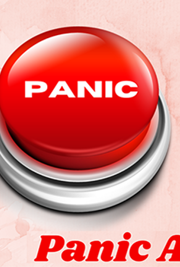
What is Panic Disorder and How do you treat It
13 Jul 2020- Panic disorder is an anxiety disorder characterized by reoccurring unexpected panic attacks.(Intense Episodes of Anxiety)
- About 3% of the population suffer from Panic Disorder.
- A panic attack is a sudden episode of intense fear that triggers severe physical reactions when there is no real danger or apparent cause.
- Described as ‘Bolt from The Blue’
- Many people have just one or two panic attacks in their lifetimes, and the problem goes away, perhaps when a stressful situation ends. But if you've had recurrent, unexpected panic attacks and spent long periods in constant fear of another attack, you may have a condition called panic disorder.
- Although panic attacks themselves aren't life-threatening, they can be frightening and significantly affect your quality of life.
- Panic attacks have many variations, but symptoms usually peak within minutes. You may feel fatigued and worn out after a panic attack subsides.
Panic attacks typically include some of these signs or symptoms:
- Sense of impending doom or danger
- Fear of loss of control or death
- Rapid, pounding heart rate
- Sweating
- Trembling or shaking
- Shortness of breath or tightness in your throat
- Chills
- Hot flashes
- Nausea
- Abdominal cramping
- Chest pain
- Headache
- Dizziness, light-headedness or faintness
- Numbness or tingling sensation
- Feeling of unreality or detachment
- Panic attacks may come on suddenly and without warning at first, but over time, they're usually triggered by certain situations.
- Can cooccur with other psychiatric disorders Viz: Other anxiety disorders, Phobic disorders, Substance use disorders and Depression.
- Anticipatory anxiety & Avoidance can occur and produce significant distress.
- Since it mimics a Myocardial Infarction (Heart Attack), patients are usually rushed to the Emergency Department and undergo multiple unnecessary investigations.
- Panic disorder is generally treated with Medication, Psychotherapyor both.
- Medication. Doctors also may prescribe different types of medications to help treat panic disorder:
- Selective serotonin reuptake inhibitors (SSRIs)
- Serotonin-norepinephrine reuptake inhibitors (SNRIs)
- Beta-blockers
- Benzodiazepines
- Psychotherapy: CBT, Exposure therapy & Relaxation (JPMR, Mindfulness)
- Usually, a combination approach including life style modifications is advised
- Remember: No two people are affected the same way by Panic Disorder. There is no “one-size-fits-all” for treatment.
- Talk with your doctor about the best treatment for you.